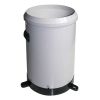HyQuest Solutions FCD Field Calibration Devices
Features
- Compact, light-weight, portable, packed in a robust aluminum carry case
- Corrosion-resistant (made of stainless steel, nickel silver and UV stabilized Delrin)
- No maintenance required
- Free ground shipping
- Expedited repair and warranty service
- Lifetime technical support
- More
Overview
The HyQuest Solutions Field Calibration Device (FCD) checks rain gauges in the field for accuracy. The portable, lightweight device effectively enables field technicians to run functional tests and verifications of any rain gauge in the field. The use of FCD saves time and money because the tipping bucket rain gauges can remain fixed in their location without the need for dismantling and transport and with very short downtimes for calibration only.
Mechanics
FCD checks whether a rain gauge is providing accurate readings: It discharges a certain volume of water into the rain gauge collector. Then, the number of tips has to be counted and checked with the calibration specifications.
Material
- Body: synthetic thermoplastic resin (polycarbonate)
- Nozzle: Delrin and nickel silver
- Vent: stainless steel
- Adaptor: Delrin
Capacity
- 653mL (used with TB3, TB4, TB6, TB7)
Nozzle
- 50mm/hr or 100mm/hr
Carry Case
- Robust aluminium carry case, with heavy duty foam
Dimensions in Case
- 400mm x 250mm x 95mm
Packed Weight and Size
- 2.4 kg, 400mm W x 250mm D x 95mm H
Scope of Delivery
- One nozzle included
- Calibration specifications
- Carry case
In The News
Climate Change and Microplastics: Monitoring Lake Champlain
Most people go to Lake Champlain for its exceptional views and thrilling boating, but it’s also home to a wide variety of interesting aquatic research projects. From studying microplastics to thermal dynamics of the lake, Timothy Mihuc, director of the Lake Champlain Research Institute (LCRI) at the State University of New York at Plattsburgh (SUNY Plattsburgh), has spent his career studying aquatic ecosystems. As an aquatic biologist, he’s the main investigator on Lake Champlain’s research studies while also managing their grants, employees, and their hands-on buoy work. Over the years, LCRI has received a number of environmental grants that aid in its monitoring research.
Read MoreCurrent Monitoring after the Francis Scott Key Bridge Collapse
On March 26th, according to The Baltimore Sun , a 984-foot, 112,000-ton Dali lost propulsion and collided with a support column of the Francis Scott Key Bridge, collapsing the structure. Soon after the event, search and rescue, salvage crews, and other emergency responders were mobilized after the collision. As salvage efforts progressed in early April, NOAA’s Center for Operational Oceanographic Products and Services (CO-OPS) responded to a request for real-time tidal currents data and deployed a current monitoring buoy—CURBY (Currents Real-time BuoY)—into the Patapsco River north of the Francis Scott Key Bridge.
Read MoreSoundscapes of the Solar Eclipse: Citizen Science Supporting National Research
On April 8, 2024, millions of people around the world had their eyes glued to the sky to witness a historic cosmic event. The total solar eclipse captured the headlines and the minds of many who became eager to gaze at the heavens as the sky went dark for a few minutes. However, not everyone used their sense of sight during the eclipse, some were listening to the sounds of the natural world around them as the light faded from above. The Eclipse Soundscape Project is a NASA-funded citizen science project that focuses on studying how the annular solar eclipse on October 14, 2023, and the April 8, 2024 total solar eclipse impacted life on Earth. The project revisits an initiative from the 1930s that showed animals and insects are affected by solar eclipses.
Read More










